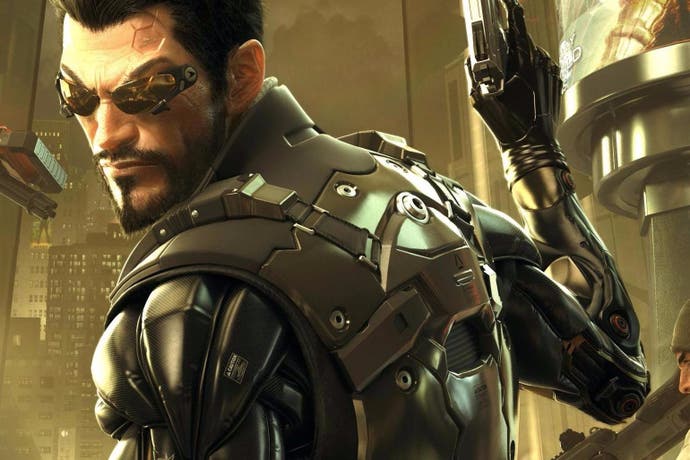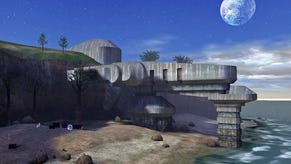Why the future of Deus Ex lies with its past
Reverse-engineering.
Pull up the design materials for the original Deus Ex today, and you may be struck by what Ion Storm never quite managed to achieve. In a Gamasutra postmortem from 2000, designer Warren Spector presents a vision for the game that is actually two visions in competition - a splicing of genres to support a range of well-defined playstyles, versus the concept of a simulation in which there are no fixed outcomes, no pre-existing, over-arching formulations, just abilities and variables, chiming together under the player's hand. A simulation so intricate and responsive, it perhaps never had a hope of being made with the technology of the era.
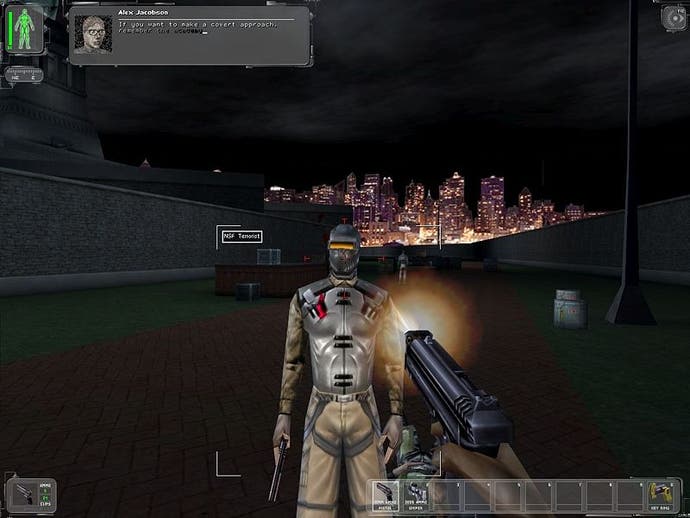
In his opening, Spector touches on the game's debts to shooters, role-players and narrative-driven adventures. "But more important than any genre classification," he adds, "the game was conceived with the idea that we'd accept players as our collaborators, that we'd put power back in their hands, ask them to make choices, and let them deal with the consequences of those choices." The dream, in other words, wasn't just to fold a few popular approaches into one another but to create a game that transcends category altogether, that is all but defined as you play.
Narrative and setting were intriguingly peripheral to this agenda, at least to begin with - Deus Ex may be the definitive cyberpunk game, with its dingy Blade Runner lighting, sleek trenchcoats and penchant for subcutaneous technology, but according to Spector, Ion settled on a sci-fi backdrop merely "to buy ourselves some room to play around - the real world, as we quickly discovered, was very limiting." One, very early pitch for the game then known as "Troubleshooter" featured a present-day setting and was modelled on the antics of 80s action stars like Steven Seagal - a blasphemous-sounding turn, given how avidly the franchise's present custodians have courted comparison with celebrity fashion designers and philosophers.
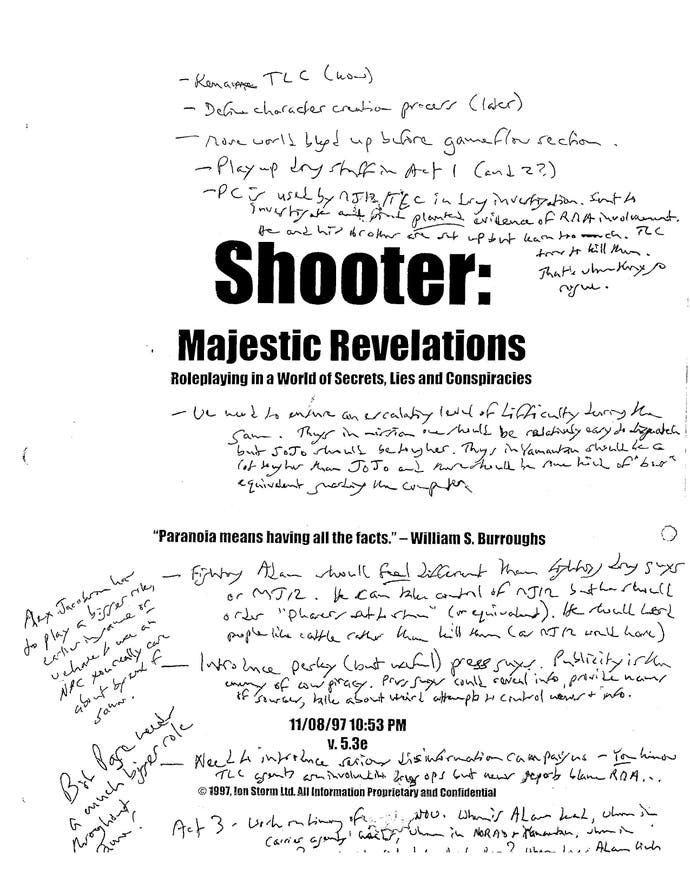
Perhaps inevitably, the project's ambitions foundered during production, as the team's design documentation swelled into the hundreds of pages and Ion struggled to whittle its ideas into something Eidos Interactive could sell. Spector and his colleagues were ultimately obliged to cram their game into a more rigid, predictable mould, its possibilities grouped into a series of distinct, branching approaches. "We just didn't have a deep enough simulation nor did we have the time or personnel to create one," he recalled. "We found ourselves in the position of having to brute-force the multiple-path idea, as developers on Ultima games, for example, have done for years - though I think we do more of it, more consciously and more effectively, than anyone else has to date. Designers have had to plan a 'skill' path past problems, an 'action' path and a 'character interaction' path. It works, but it's not what we originally intended."
The first Deus Ex is often touted as the pinnacle of system-driven, open-ended design. But in some ways, its failures have proven more enduring than its successes. The game's eventual, more restrictive path structure - split between combat, stealth, hacking (whether literal, or more loosely defined as meddling with the environment) and social interactions - has become the blueprint for any mainstream action-oriented project that prides itself on allowing for "choice and consequence". It's a dependable and flexible template, traceable beneath the skin of experiences as diverse as Uncharted, Hitman and Bioshock, but it's an approach whose ubiquity has siphoned away oxygen from other kinds of interaction. Indeed, the valorised notion of choice has somewhat atrophied in games of this stripe. How many times have you heard a producer speak loftily of "meaningful decisions" in a game, only to discover that what this signifies in practice is deciding whether to sneak through a position, or go in "all-guns-blazing"?
2011's rapturously reviewed Deus Ex: Human Revolution and last year's Mankind Divided might have been a chance to pick up where Ion Storm lost its thread - to dispense with some of the first game's constraints, kick those vaunted gameplay pillars away and edge a little closer to Spector's original pitch. But, tasked with resurrecting a troubled brand following the untimely demise of Deus Ex: Insurrection and Deus Ex 3, Eidos Montreal opted to double-down on the fundamentals. Speaking at GDC 2012, gameplay designer Francois Lapikas discussed how the studio went about clarifying Ion Storm's achievements in Human Revolution, drilling into rather than building them out - with smaller, semi-open sandbox maps and abilities that have more pronounced, snappy, "visceral" applications, as against the "very experimental and simulation-oriented" feel of the original.
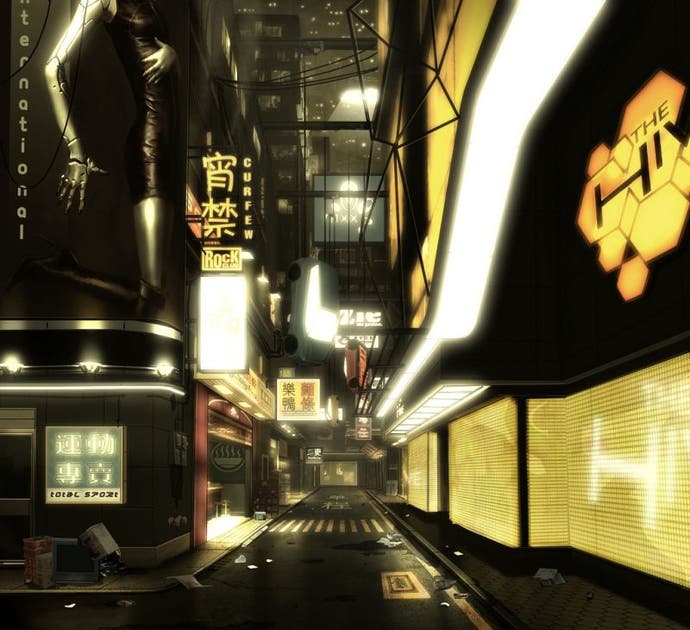
The result is a pair of tremendous, luxuriantly detailed action-RPGs that react to your antics in an engrossing way - who could forget goofing around with the water fixtures at Sarif HQ, only to find that the terrorists you're supposed to be hunting have ransacked a base in your absence. But Eidos Montreal's contributions are also a missed opportunity to evolve, games that are never quite more than the sum of parts gleaned from titles like Mass Effect, FEAR, Rainbow 6 and Metal Gear (all referenced by Lapikas in his GDC presentation). It's obviously unfair to set a finished project with all the nips, tucks and wholesale feature-junking this entails against one that never made it to shelves, but compare and contrast Ion's plans for Deus Ex 3, which would have unobtrusively generated new missions for the player, depending on how you behave. A campaign of unpredictable fecundity, versus the clever but unadventurous objective design of Human Revolution.
Eidos Montreal's greatest success, in hindsight, is its environment design and art direction - albeit to large degree because that elegant mingling of fraught visual registers is a hearty corrective to the brittle, socially aware yet desperately non-committal tenor of its plot and writing. The game's "cyber-renaissance" aesthetic isn't just a goofy period parallel, tying the age of biomechanical augmentation to the flowering of European science and literature in the 15th century - it's a sustained working-through of rival ideologies, an argument between vanishing histories and half-realised futures, bursting from every fissure of Mankind Divided's Prague and Golem City hubs.
There are the tumorous, blocky, blue-lit up-growths of the Palisade Bank, that heart of darkness where the insanely affluent store their secrets. There are the cascading, undulating, gilded dioramas of underground activists, prophets and freedom fighters, chambers where leather-bound volumes and rolls of cloth fight for room with stacks of monitors and circuitboards. Key to the appeal of these opposed styles and spaces is that they express something of how you play the game, switching from acrobatic traversal through dogged, point-to-point stealth to flowing combat as your surroundings alternate between crisp, imposing corporate utility and the scuffed, dishevelled glory of resistance lairs and black market workshops. It might be the same broad setup as in every other "grown-up", "choice-driven" action-adventure offering since the original Deus Ex, but Mankind Divided's scenery at least infuses the process with a peculiar resonance.
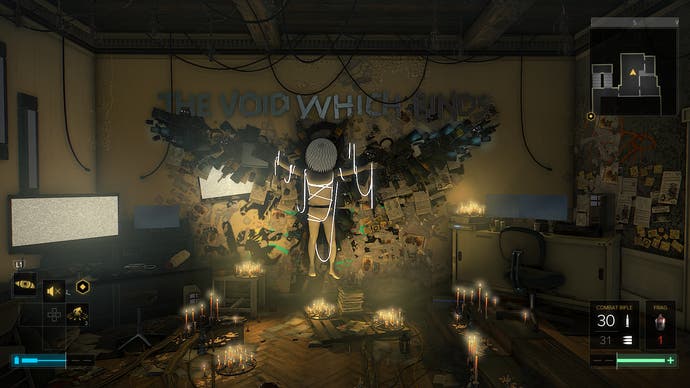
The art direction isn't without its share of unacknowledged irony, admittedly. Human Revolution and Mankind Divided's renaissance riffs are as much vintage-chic as they are modellings of ideology at work on a landscape, and there are plenty of oh-so-topical scenery elements that come off as hopelessly contrived - the Banksy-esque graffiti, the "Aug Lives Matter" newspaper headlines that clumsily associate the game's downtrodden cyborgs with victims of real-world oppression. But this is a mesmerising portrayal of a late capitalist society falling into its own rot, done too little service by a framework that defaults relentlessly to shooting or infiltration. I enjoyed Mankind Divided - read my review for thoughts on its often-scintillating layouts - but I was always conscious that it was a compromise.
The series' future is once again in doubt. Eurogamer reported earlier in the week that Square Enix had shelved Deus Ex for the moment, following sub-par sales of Mankind Divided. Eidos Montreal is apparently now helping out Crystal Dynamics with the next Tomb Raider sequel, plus the first in a series of Marvel Universe games. It's probably a good time to take a break, but I hope a developer finds its way back to this universe eventually - because as pioneering as Deus Ex has proved, and as lustrous as it has become under Eidos Montreal's hand, Warren Spector's old concept-work harbours the glimmer of something grander.
